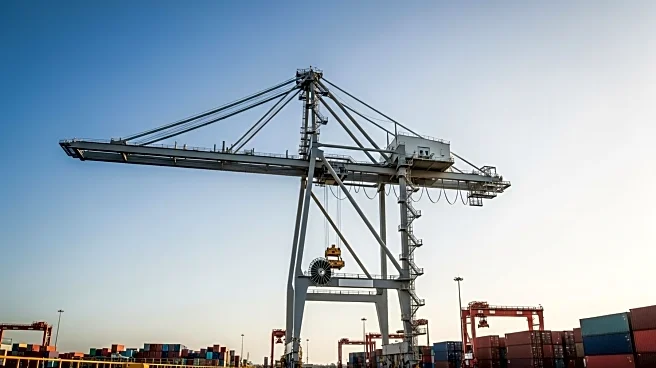What's Happening?
Peel Ports Group has unveiled a £100 million investment plan aimed at expanding its UK steel and metals multimodal logistics capabilities. The initiative includes a £32 million immediate expenditure to enhance warehousing at the Port of Liverpool's steel and metals terminals. This expansion will increase the port's covered storage to 56,700 square meters and add capacity for an additional 35,000 tonnes of product. The overall warehousing capacity across Peel's sites in Liverpool and Sheerness is set to grow by 50 percent, with plans for an additional 46,500 square meters. The expansion follows a significant rise in steel volumes at Liverpool, which saw a 35 percent increase last year, handling 702,000 tonnes of bulk steel.
Why It's Important?
This investment is crucial for the UK's logistics and steel import sectors, as it addresses the growing demand for steel imports, which have surged over the past five years. By expanding warehousing and improving rail connectivity, Peel Ports aims to enhance its distribution capabilities, supporting the inland movement of goods. The development is expected to bolster the UK's position in the global steel market, providing more efficient handling and storage solutions. The expansion also signifies Peel Ports' commitment to strengthening its infrastructure to accommodate increasing trade volumes, potentially benefiting related industries and regional economies.
What's Next?
Peel Ports plans to construct a second automated steel coil terminal at the Port of Liverpool and a new facility at the Port of London Medway in Sheerness. These will be connected to a new automated rail terminal in the Midlands, facilitating inland distribution. The company is also recruiting additional stevedores and training existing staff to enhance handling capabilities. As the expansion progresses, stakeholders such as contractors and architects may be selected to execute the project, although no timeline for completion has been provided.
Beyond the Headlines
The expansion of Peel Ports' logistics capabilities may have broader implications for the UK's trade policies and international relations, particularly with countries supplying bulk steel. The increased capacity could lead to more competitive pricing and improved supply chain efficiencies, potentially influencing market dynamics and trade agreements. Additionally, the focus on automation and rail connectivity highlights a shift towards more sustainable and efficient logistics solutions, aligning with global trends in reducing carbon footprints and enhancing operational efficiency.










